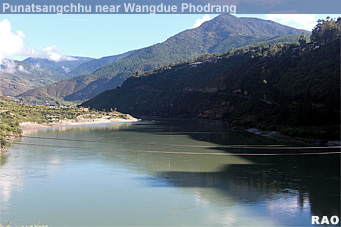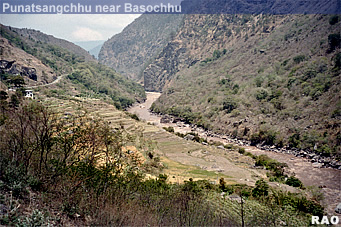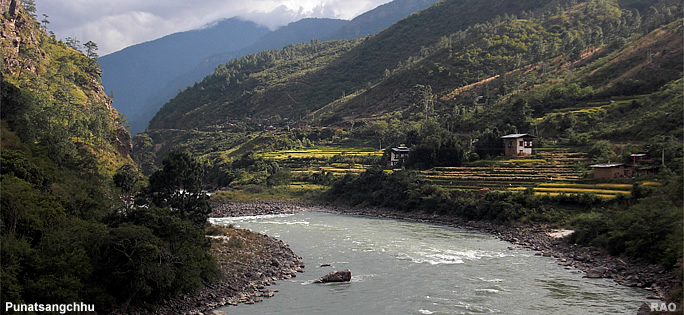 |
Bhutan's
Economy: Hydroelectric Power |
 |
Bhutan Information |
|
|
|
 |
|
Punatsangchhu Reports
|
 |
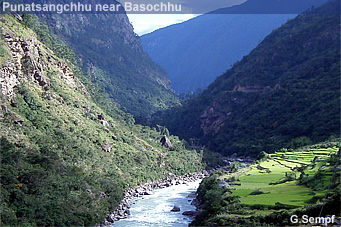 |
Displaced families disappointed
Substitute land for about 70 of the 90 families, who will be displaced by the 1,200 MW Punatsangchhu dam, has been identified, surveyed and verification is ongoing, say dzongkhag officials."We've done the valuations, now we need clearance from the forest department before submission to the land commission," said Wangdue dzongda, Lhendup Wangchuk, adding that the concerned families and a committee jointly identified the substitute land. |
Around 74 structures like houses, fences, walls, temporary sheds, and cowsheds belonging to the displaced families have been studied and the findings submitted to the finance ministry. For orchards and crops owned by some of the displaced, farmers would be paid the revised rates of compensation, said district agriculture officer, H P Adhikari.
"Crops not listed on the revised compensation rate would be based on the local rate," he said. The infrastructure and cash crops is estimated at more than Nu 31 million, which does not include the value of land.
Of the remaining 20 families, some are absentee landlords, while others did not like the substitute land they were given, officials said.
It was earlier announced that these families, the largest number of people ever displaced in such circumstances in Bhutan, may just get the compensation they desire. The affected families of three gewogs of Thedtsho, Tshogom and Rubesa, however, said that this wasn't happening and that they are not happy with the way things are taking shape.
"We can't even find land that is suitable for agriculture and the one that the committee identified isn't worth it," said Namgay Bidha, 66. "I don't have any idea how much they'll pay as compensation for my house but it won't be enough to build a house again."
In April this year, when the government ordered the families to relocate, the families chose the land option instead of monetary compensation.
Tashi Thinley, 57, a father of six children, said that, if they had accepted the monetary compensation, they wouldn't be able to buy land anywhere. "We've lived here all our lives now we have to leave," he said.
Most of the substitute land is located on cliffs and ridges, away from the roads and without water supply and electricity, said farmers.
"It's like starting from the scratch. We aren't even sure whether the land that would be allotted to us would give us similar yield like before," said another farmer, a father of four children.
The land record officer of the dzongkhag, Sangay Yonten, agrees that the farmers may not be satisfied with the substitute land. "But there is no land to make everyone happy and we have to follow the land act when we allot land," he said.
The land substitute allotted to the farmers is in different locations like Tshogom, Tshowom, Thedtsho and Rubesa, ranging from a minimum of two decimal to three acres, said Sangay Yonten. "In most locations, there is no electricity, water or roads. But some are connected to the feeder road," he said.
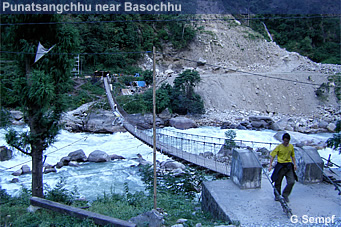 |
| The land belonging to the families that fall under the submergence area of PHP is situated near the Wangdue-Tsirang highway with sufficient water supply and electricity.
Farmers, who owned large areas of land, said that land allotment in different locations was a problem for them. For instance, if a farmer owned more than one acre land, chances are, the one acre land substitute that he avails might not be located in the same location but in different locations in decimals. |
|
Nima Dorji, 40, said that they are waiting for the government to announce the amount of compensation each farmer is likely to receive. "With the kind of compensation package the government provides I know it won't be enough to build houses like we built before without a loan," he said.
The dzongda said that, as far as the dzongkhag was concerned, they did their best. "We looked for the best available land and worked within the land act," he said.
Economic affairs minister Lyonpo Khandu Wangchuk had earlier said that the compensation package for Punatsangchhu would be a precedent for future families displaced by dams.
Punatsangchhu-I will be the largest hydro power project to be undertaken in Bhutan in partnership with the Government of India and is yet another milestone in India-Bhutan cooperation in the field of hydropower.
| Source: Kuensel, Bhutan's National Newspaper, November 2009 |
 |
| Information on Bhutan |
 |
|




